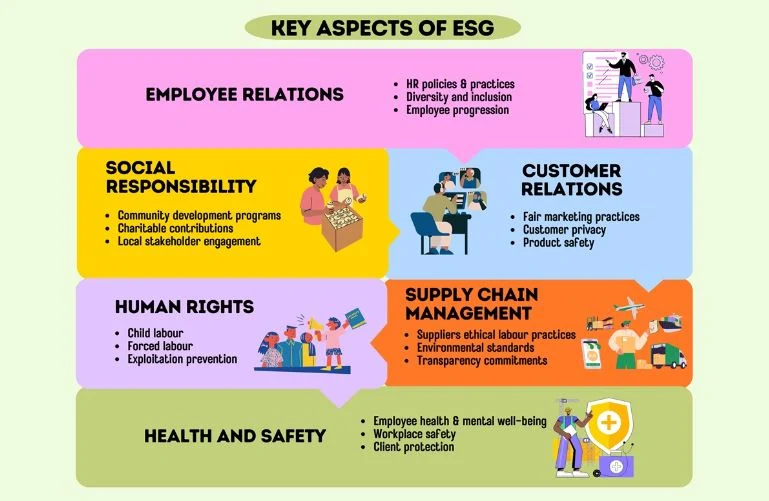
Tariq Chauhan, Group CEO of EFS Facilities Services Group, explores the social dimensions of ESG and underscores the need for a holistic and heart-felt approach to overcoming the challenges and making an impact.
For a significant period, I have advocated the necessity for corporations to deeply reflect on their social alignments before embarking on any environmental, social, and governance (ESG) mission. ESG demands that companies encode social consciousness into the fabric of their organization. This should not be a mere formality; I firmly believe that no company can achieve its sustainability goals without holistically embracing values that espouse social consciousness and integrating them into policies with an impact-driven corporate agenda.
ESG: the Social Dimensions
Here, I want to discuss ESG, its key aspects, some misconceptions, and challenges associated with its social dimensions.
- Employee relations: This includes HR policies and practices, workplace safety, diversity and inclusion, and employee progression and development in line with global best practices. The social aspect of ESG evaluates how companies treat their employees and foster a positive work environment. It also promotes ethical practices by enforcing strict measures of honesty and integrity across its workforce.
- Social responsibility: For corporations, community engagement is a critical requirement, and they are expected to contribute positively to the communities in which they operate. Not only does community engagement make a positive impact on society, but it also helps build trust with employees as they see community outreach as a good management lever. Engagement comes in many forms; it can involve community development programs, charitable contributions, or collaboration with local stakeholders. Whatever its form, community engagement must be managed honestly with a defined social purpose and impact. It should also amount to much more than mere tokenism resulting from compliance requirements, client demands, or a show of leadership or corporate branding.
- Customer relations: The social tangent of ESG also extends to customer relations, where businesses must ensure fair marketing practices, customer privacy, and product safety. Ethical treatment of customers and suppliers, with transparent communication, helps in customer retention and business growth.
- Supply chain management: Supply chain alignment is another essential component of ‘S’ in ESG. Corporations must ensure their suppliers adhere to ethical labor practices and environmental standards. Adherence to transparency pledges that help ensure proper governance is a strict requirement involving audits and assessments.
- Human rights: Human rights adherence is yet another requirement for companies, especially those operating in conflict zones, to ensure they do not benefit from unethical or conflict-related interests. Sticking firmly to human rights laws and best practices helps to guarantee that their operations do not contribute to human rights abuses, such as child labor, forced labor, or any other practice that undermines social principles.
- Health and safety: Protecting the health and safety of employees in terms of mental well-being and workplace safety, as well as protecting their clients and consumers, is a priority, particularly in industries with higher risks.
The Challenges
There are multiple challenges that corporates struggle to adhere to when it comes to the social compliance of ESG, with cost burden, impact assessment, and measuring criteria counting among them. Yet, slack compliance is a lose-lose for all involved.
Many organizations often circumvent ESG compliance, citing the cost burden and its impact on their profits. While there can indeed be a cost dimension, lack of will is often due to a lack of social consciousness rather than resources. As for measurement and reporting, quantifying social impacts and establishing reliable metrics for assessment can be difficult. Standardized reporting frameworks are typically absent and social aspects like employee happiness, human rights, or supply chain adherence can be hard to measure.
Supply chain complexity is another limitation. In many businesses, the chain is fragmented and managing social responsibility throughout complex global supply chains poses significant challenges, especially when it comes to ensuring compliance across various jurisdictions.
Stakeholder expectations can also serve as a significant deterrent to ESG initiatives. Different stakeholders-investors, customers, employees, communities-may have varying and sometimes conflicting expectations regarding social responsibility, with corporations torn between them. Clients expect high standards while often disregarding the cost, while supply chain partners rarely want to shoulder the additional price for compliance.
A further obstacle to social compliance sometimes stems from cultural differences. Operating in multiple countries can lead to challenges in balancing global corporate standards with local cultural norms and practices. For instance, compliance with diversity and inclusion targets is complex in certain countries where other considerations prevail.
Adding to the list of challenges are regulatory compliance, reputation management, and resource allocation. Navigating regulatory compliance, such as labor rights, consumer protection, and community engagement, can be complex and resource intensive, while social missteps can cause significant damage to a company’s reputation, making it crucial for companies to manage their social responsibilities proactively.
As for resource allocation, balancing investments in social initiatives with business performance can be challenging, particularly in industries facing financial pressures or with lower-margin businesses. Stakeholders may disagree with the related costs and have little to no clarity regarding the benefits. Such disagreement and misalignment with management often lead to even more challenges.
ESG Needs a Holistic Approach
To address this formidable list of potential challenges, companies must develop a holistic approach, carefully balancing stakeholder expectations while improving their social performance and contributing to sustainable development.
They must set aside the belief that ESG is cost and compliance-centric only. I believe that if ESG is applied effectively, it can substantially benefit the company in many ways, from solid client acquisition to retention to profits, while also enhancing brand equity, reputation, and stakeholder trust.